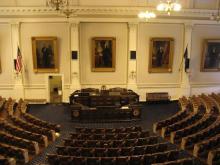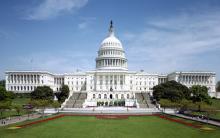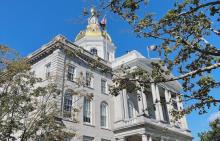It’s been a busy few months with bills coming before the House specifically targeting fellow human beings, whether they happen to be asylum-seekers, documented, undocumented or here on student visas. First we had a “preventative” bill, HB 71 preventing schools from closing if asylum-seekers or refugees, here legally, are looking for emergency shelter. Keep in mind, this is something that has NOT happened here. Besides, according to the sponsor, schools are supposed to be SCHOOLS, especially if they receive state money, if there’s any left after the private, religious schools get their take.
SB 13 is meant to invalidate out-of-state driver's licenses issued to undocumented refugees. People who have these out-of-state licenses, including refugees, must originally pass road test exams, have driver identification, and often have car insurance. Simply put, if you are stopped for whatever reason on a NH road and you are not of this country, your out-of-state driver’s license can be confiscated according to this legislation.
Defining requirements about issuing and renewing of nonresident refugees drivers' licenses who are in NH temporarily, was HB 452. In a nutshell, you will not be able to renew a driver's license if you are not an American citizen and can’t prove you are a lawful permanent resident of this country. The sponsors made it harder for a lot of people here under protected status or asylum seekers who have jobs or attend school to get there.
HB 461 required all printed and digitally available driver's license exam-related materials, including the exam itself, be available and given in English only. Luckily, the Senate’s Transportation Committee voted this mean bill as “Inexpedient to Legislate.”
HB 511 is one of many bills that is intended to strip local control away. This one will prohibit state and local government from endorsing sanctuary policies to prohibit or obstruct the enforcement of federal immigration law (ICE). This was a bill sponsored by Rep. Joe Sweeney, R-Salem, who feels the need to constantly remind the House, “if you are in NH illegally, you are NOT welcome in NH,” or “take the cuffs off local law enforcement to work with ICE,” or “should not have sanctuary in our cities, churches or schools.”
These bills have come from members of Liberty Alliance, one of multiple extremist groups in the state and have already been voted on.
Yesterday we voted on (among other bills) SB 62, a bill that removes the power of local towns and counties to have any say in how taxpayer funded law enforcement resources are used to support ICE efforts. Law enforcement agencies who enter into arrangements with ICE receive training with all operational charges placed on the shoulders of taxpayers in the towns or communities signing on to the arrangement. There is nothing in the bill which gives town/city officials the chance to decide if this is something they want in their community. More chipping away at local control.
But before we could vote on the bill, Rep. “if you are in NH illegally, you are NOT welcome in NH,” Sweeney (yes, he had to say this again) had a floor amendment to shove down everyone’s throats. The amendment would hurt taxpayers. . . again, while taking away more local control. . .again.
“Any local governmental entity that violates this chapter may be subject to action by the attorney general, who may file suit against a local governmental entity in a court of competent jurisdiction for a violation of this chapter. Relief for violations of this chapter shall be determined by the court and may include injunctive relief and punitive damages. Punitive damages may include a fine of up to 25 percent of the total state funds received by the local government entity in the fiscal year when the violation occurred. Any fines collected for violations of this chapter shall be lapsed to the general fund of the state of New Hampshire.”
The amendment and the bill as amended passed, I am sorry to say.
Their collective hatred towards those who come here seeking safety, asylum and a better life for themselves and their families, much like many of our own ancestors did, truly is quite palpable.
“Give me your tired, your poor, your huddled masses yearning to breathe free.”
Emma Lazarus, The New Colossus
“For I was hungry and you gave me something to eat, I was thirsty and you gave me something to drink, I was a stranger and you invited me in, I needed clothes and you clothed me, I was sick and you looked after me, I was in prison and you came to visit me.”
Matthew 25:25-36










